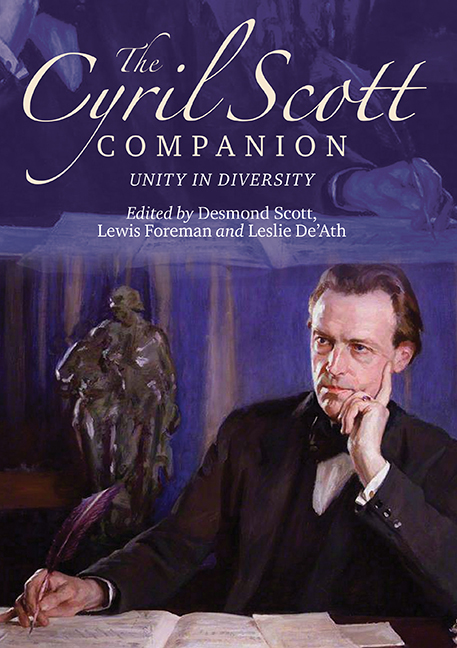Book contents
- Frontmatter
- Dedication
- Contents
- List of Illustrations
- List of Tables
- List of Contributors
- Foreword
- Preface
- Acknowledgements
- Editors' Note
- I SCOTT IN CONTEXT
- II THE MUSIC
- 8 Discovering, Editing and Recording Cyril Scott
- 9 ‘Years of Indiscretion’: The Early Piano Works, 1898–1909
- 10 ‘Like a Bird Sings’: The Piano Works from the Op. 66 Sonata to World War 1
- 11 The Later Piano Works
- 12 The Twenty-First-Century Orchestral Recordings: The Shock of the Unknown
- 13 The Chamber Music
- 14 Operas and Music for the Theatre
- 15 The Choral Works
- 16 The Songs
- III THE WRITINGS
- IV PERSONAL REMINISCENCES
- APPENDICES
- CATALOGUES, DISCOGRAPHY AND BIBLIOGRAPHY
- Index of Works
- General Index
12 - The Twenty-First-Century Orchestral Recordings: The Shock of the Unknown
from II - THE MUSIC
Published online by Cambridge University Press: 14 September 2019
- Frontmatter
- Dedication
- Contents
- List of Illustrations
- List of Tables
- List of Contributors
- Foreword
- Preface
- Acknowledgements
- Editors' Note
- I SCOTT IN CONTEXT
- II THE MUSIC
- 8 Discovering, Editing and Recording Cyril Scott
- 9 ‘Years of Indiscretion’: The Early Piano Works, 1898–1909
- 10 ‘Like a Bird Sings’: The Piano Works from the Op. 66 Sonata to World War 1
- 11 The Later Piano Works
- 12 The Twenty-First-Century Orchestral Recordings: The Shock of the Unknown
- 13 The Chamber Music
- 14 Operas and Music for the Theatre
- 15 The Choral Works
- 16 The Songs
- III THE WRITINGS
- IV PERSONAL REMINISCENCES
- APPENDICES
- CATALOGUES, DISCOGRAPHY AND BIBLIOGRAPHY
- Index of Works
- General Index
Summary
CYRIL Scott's centenary in 1979, nine years after his death, was a low moment. Christopher Palmer wrote: ‘Few composers of the “lost generation” of English Romantics stand in such urgent need of rehabilitation as Cyril Scott.’ The Cyril Scott Society had become defunct even earlier, soon after it was founded in 1964. I was aware of Scott's crippling neglect at a time when I was giving many recitals with my sister, the mezzo Meriel Dickinson, and proposed a modest centenary programme of songs and piano music to BBC Radio 3 – where Scott had been neglected or condescended to for many years. This programme was called Two Post Impressionists and coupled Scott with the American Charles Tomlinson Griffes (1884–1920). They both had anniversaries in the same month; they were pioneers in a modern idiom, especially in harmony; they were involved in oriental thought; and they studied in Germany at a time when their own countries were not regarded as suitable training grounds for composers. They were both professional pianists with important piano works, and Scott's First Sonata (1909) was ground-breaking in both harmony and metre. Thanks to Sarah Collins we now know far more about Scott's integrated range of activities – literary, philosophical, medical and occult – and his music can be approached from a wider perspective than in the past.
What has transformed the whole climate for Scott's music is the flood of recordings in the twenty-first century. This began after Scott's partner, Marjorie Harston- Scott, died in 1997 and his son, Desmond Scott, came into possession of his father's papers. He found a quantity of unpublished and even unperformed music. Recent recordings allow us to assess much of it for the first time.
The first category contains early works that did achieve performance. The First Symphony in G major was written in 1899 and played the following year by the Darmstadt Opera Orchestra under Willem de Haan. Scott attributed this only known performance to the influence of his friend the poet Stefan George. The score comes from the Grainger Museum and some completion was required. The first two pages of the third movement have been provided from internal evidence by Leslie De'Ath, who has recorded the complete piano works.
Information
- Type
- Chapter
- Information
- The Cyril Scott CompanionUnity in Diversity, pp. 177 - 188Publisher: Boydell & BrewerPrint publication year: 2018
